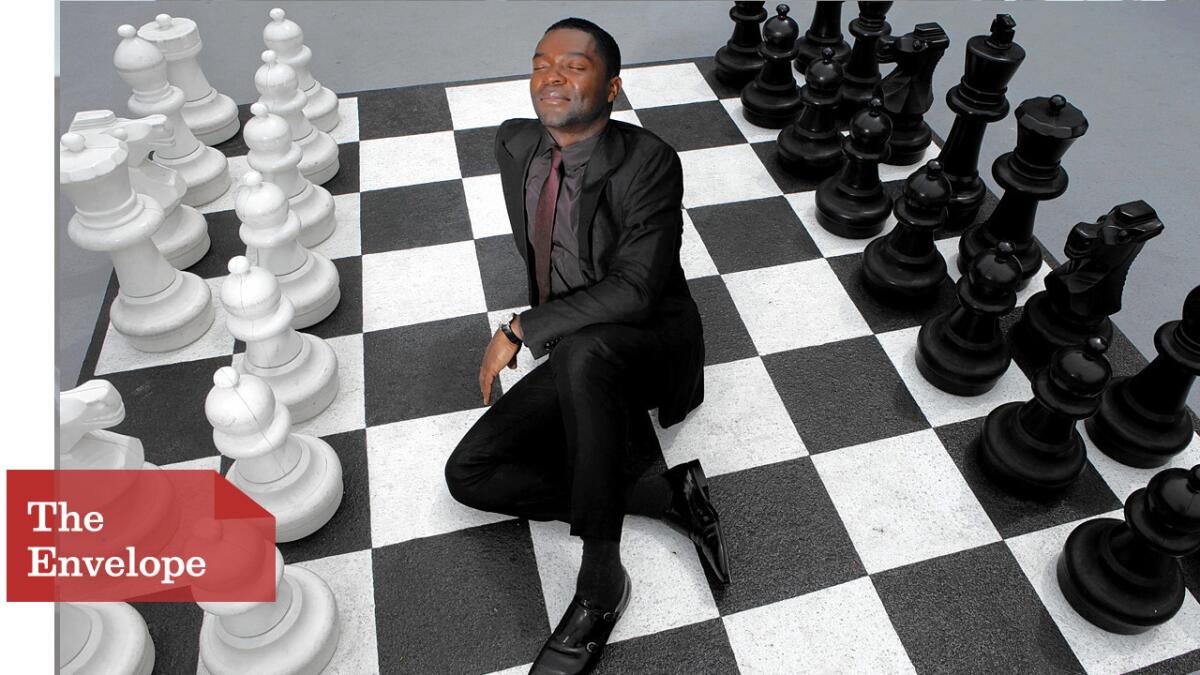Q&A: David Oyelowo looks for âbrave, meaningful workâ

Six months before he floored audiences with his thrilling portrait of the Rev. Martin Luther King Jr. in âSelma,â David Oyelowo had another movie, âNightingale,â premiere at the Los Angeles Film Festival. Itâs all Oyelowo, a one-man show about an Army veteran fighting a losing battle with the voices in his head.
HBO picked up the film after Plan B, the production company run by Brad Pitt, Dede Gardner and Jeremy Kleiner that co-financed âSelma,â signed on as a partner. It turned out to be a memorable reunion, as Oyelowo recently told The Envelope.
What were your expectations for âNightingaleâ after it premiered last year at the Los Angeles Film Festival?
At best, an interesting distributor picks it up, it plays for a couple of weeks, max, in New York and L.A. and ends up streaming somewhere. And every now and then, somebody stumbles upon it and gets something from it.
The subject matter is pretty audacious.
Movies donât get made about those guys. And certainly not me playing those guys. Thatâs why I jumped on it. It was not written for an African American character. It feeds into my bigger mission, which is to show the world as it actually is as opposed to how itâs perceived to be in cinema and on the news. It was an artistic endeavor, yes, but it was also about the power of the image.
I heard a story about your son asking if you were âplaying the main characterâs friendâ in your upcoming movie about a Ugandan chess prodigy.
That was a powerful question. Itâs an indictment on what he sees day in and day out in movies. Heâs an avid movie watcher, and even with me having just played Martin Luther King in âSelma,â he still felt the need to ask that question.
Images matter. And heâs not seeing them.
And images are political. So for a time, I have an opportunity to be part of shifting some of those paradigms. That question from my son was a big eye-opener for me about how necessary it is, not only for my children but just society in general. My ambition is to see stories that otherwise wouldnât be told and characters that are often seen as peripheral in mainstream Hollywood take center stage. And that, for me, is primarily black people.
Lee Daniels, whom you worked with on âThe Butlerâ and âThe Paperboy,â is making it work with âEmpire.â
The success of âEmpireâ is indicative of a lie that has been told for years, that nobody would watch a black family on a mainstream network show. Itâs the same preconceptions we battled with âThe Butler,â when they told us the movie wouldnât travel. That film ended up making nearly $200 million worldwide. These are lies upheld by people who want to perpetuate a certain mythology because it serves their own agenda, which is them wanting to see themselves in movies.
The pushback against âSelmaâ was remarkable in that regard.
That started when [director Ava DuVernay] came along and reshaped âSelmaâ in a way where everyone goes, âOh, gosh, is this how youâre going to tell the story? Youâre going to boost all the female roles in it?â Yes. Thatâs what weâre going to do because those women were there. Thatâs why we need more women filmmakers too.
Itâs bizarre. Whatâs the figure? Four percent?
And itâs .4% of black women directing movies. I have a big desire to be a part of shifting that. You direct or act or produce what you want to see, which tends to be a reflection of who you are. Iâm making a movie in October, âA United Kingdom,â about the heir to the throne of Botswana who married a white lady. Their interracial marriage caused a diplomatic earthquake between South Africa, Botswana and the United Kingdom. And you just donât see those stories, certainly not from the point of view of a black South African who married a white lady.
Do you think progress is being made then for better racial and gender inclusion?
Historically what has happened is that you have a moment and then everyone feels like, âOh, itâs changing,â and then everyone relaxes. And the one thing I refuse to do is relax and assume that weâre in the middle of a critical mass that is now going to self-perpetuate.
Like when Kathryn Bigelow won the Oscar for directing âThe Hurt Lockerâ and people thought it would be a giant leap for female filmmakers ...
I spoke to a producer the other day, saying she had to deal with other producers complaining that a certain female director was a bit emotional and how are we going to deal with that? (a) Sheâs a human being. (b) Sheâs a storyteller and, arguably, you want to have emotion in your story. Itâs the same thing with a black director. âOh, gosh, theyâre intense. They can be a bit angry or militant.â Itâs all born out of fear â fear of a loss of position, fear of the world changing too fast.
How do you change that?
You engage in that fear. I like to think Iâm a good actor, but Iâm not owed a career. But while I have a degree of notoriety and a window whereby people are interested in what I do, Iâm going to try to do brave, meaningful work that tells the truth and shifts some of the tough ground that I feel Iâve had to endure and, at the very least, make it more supple for those coming behind me.
More to Read
From the Oscars to the Emmys.
Get the Envelope newsletter for exclusive awards season coverage, behind-the-scenes stories from the Envelope podcast and columnist Glenn Whippâs must-read analysis.
You may occasionally receive promotional content from the Los Angeles Times.











